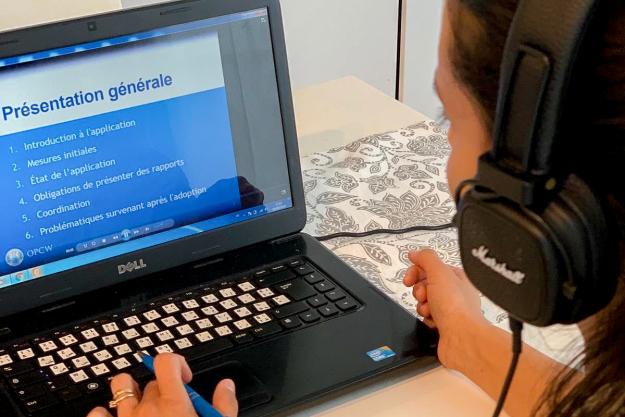
Participants at the General Training Course on the Chemical Weapons Convention for Francophone Member States
THE HAGUE, Netherlands—9 September 2020—Francophone Member States of the Organisation for the Prohibition of Chemical Weapons (OPCW) enhanced their knowledge and skills related to the effective implementation of the Chemical Weapons Convention (CWC) during a general training course held online from 7 to 9 September. The programme was tailored to National Authority staff with little or no previous experience of implementing the CWC.
The OPCW’s Director of the International Cooperation and Assistance Division, Ms Kayoko Gotoh, remarked: “This course is specifically designed to give National Authorities a comprehensive overview of the requirements of the Convention. It also introduces them to the necessary knowledge and tools to ensure effective implementation of the Convention at a national level and to encourage greater regional cooperation.”
The online training consisted of video presentations on various aspects of CWC implementation including States Parties’ obligations, the functions and responsibilities of National Authorities, and best practices for developing strong stakeholder networks. Participants also had the opportunity to take part in a live question and answer session as well as a practical exercise on the new Electronic Declaration Information System (EDIS).
The course was attended by twenty-two representatives from twelve Member States: Benin, Belgium, Burkina Faso, Burundi, Canada, Congo, Cote d’Ivoire, Guinea Bissau, Mauritius, Niger, Togo, and Tunisia.
Background
General training courses assist OPCW Member States with complying with their obligations under the Chemical Weapons Convention by enhancing knowledge and skills in national implementation.
As the implementing body for the Chemical Weapons Convention, the OPCW, with its 193 Member States, oversees the global endeavour to permanently eliminate chemical weapons. Since the Convention’s entry into force in 1997, it is the most successful disarmament treaty eliminating an entire class of weapons of mass destruction.
Over 98% of all chemical weapon stockpiles declared by possessor States have been destroyed under OPCW verification. For its extensive efforts in eliminating chemical weapons, the OPCW received the 2013 Nobel Peace Prize.
